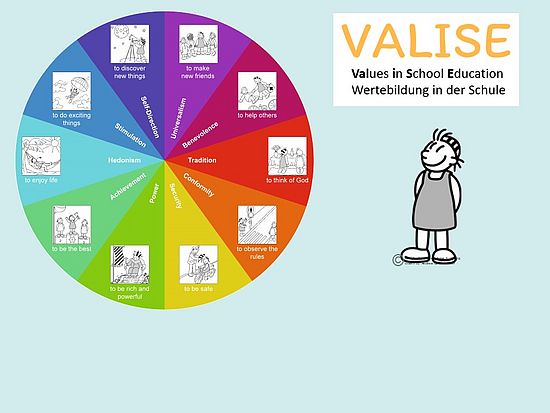
Value Formation in School
The Formation of Children's Values in School: A Study on Value Development Among Primary School Children in Switzerland and the United Kingdom
This project will illuminate how primary schools shape children’s personal value development, by employing a longitudinal design in Switzerland along with a comparative cross-sectional study in the UK. This knowledge is essential for providing evidence-based guidance for value education in schools.
Content and aim of the research project
Values are at the core of school curricula in Switzerland (Lehrplan 21) and the UK (Department of Education, 2014). Primary schools are expected to develop children’s understanding of their own and others’ values, children’s ability to express their own values and pursue behaviours that help achieving them. In most recent years there has been a steep increase of publications. However, the field is still surprisingly under-researched, and there is a lack of evidence of how children’s values develop and how they are formed in primary school. The project will help fill this research gap by focussing on two research objectives: 1) To investigate developmental trajectories of children’s value priorities in primary school and 2) to identify proximal key factors that affect children’s formation of values in the school context.
Scientific and social context
The comparative and longitudinal study examines value formation in the context of a newly developed socio-ecological model of value development in the school context. The results of the study will allow teachers to receive further training in the field of value formation of primary school pupils and to show them ways of promoting the value-related competences of children in the school context.
Duration: September 2020 – August 2024
Scientific Publications and Contributions VALISE – Project
- Scholz-Kuhn, R., Makarova, E., Bardi, A., Litzellachner, L., Benish-Weisman, M., & Döring, A. K. (2025). Children’s personal values and their behavior in the classroom in the early elementary school years
- Oeschger T. P., Makarova E., Daniel E., & Döring A. K. (2024). Value-related educational goals of primary school teachers: a comparative study in two European countries. Frontiers in Psychology.
- Daniel, E., Bardi, A., Lee, J. A., Scholz-Kuhn, R., et al. (2024). Value incoherence precedes value change: Evidence from value development in childhood and adolescence across cultures. European Journal of Personality, 0(0).
- Döring, A. K., Jones, E., Oeschger T. P., & Makarova, E. (2024). Giving voice to educators: Primary school teachers explain how they promote values to their pupils. European Journal of Psychology of Education.
- Oeschger, T. P., Makarova, E., Raman, & Döring, A. K. (2024). The interplay between teachers’ value-related educational goals and their value-related school climate over time. European Journal of Psychology of Education.
- Scholz-Kuhn, R., Makarova, E., Bardi, A., & Döring, A. K. (2023). The relationship between young children’s personal values and their teacher-rated behaviors in the classroom. Frontiers in Education.
- Oeschger, T. P., Makarova, E., & Döring, A. (2022). Values in the School Curriculum from Teachers' Perspective: A mixed-methods Study. International Journal of Educational Research Open.
- Scholz-Kuhn, R., Oeschger, T. P., Makarova, E., & Döring A. K. (2021). Wertetransmission in der Schule: Eine Studie zu Wertehaltungen von Kindern und Lehrpersonen auf der Primarstufe. Die Grundschulzeitschrift.
- Scholz-Kuhn, R., & Oeschger, T. P. (2022). Project Report. Institut für Bildungswissenschaften, Universität Basel. (PDF, 736.48 KB)
- Scholz-Kuhn, R., & Oeschger, T. P. (2022). Technical Report. Institut für Bildungswissenschaften, Universität Basel. (PDF, 2.94 MB)
- Habermann, S. (2022). UK Project Report. Institut für Bildungswissenschaften, Universität Basel. (PDF, 531.31 KB)
- Research Output (PDF, 193.54 KB)

This Study is granted by the Swiss National Science Foundation (SNSF).
Project Leaders:
- Elena Makarova (University of Basel, Switzerland)
- Anna K. Döring (University of Westminster, UK)
- Anat Bardi (Royal Holloway University of London, UK)
Postdoc:
- Stefanie Habermann (Royal Holloway University of London, UK)
PhD Students:
- Ricarda Scholz-Kuhn (University of Basel, Switzerland)
- Thomas Oeschger (University of Basel, Switzerland)
Collaborators:
- Julie Lee (The University of Western Australia)
- Maya Benish-Weisman (The Hebrew University of Jerusalem, Israel)
Study in the News
- 04/2023 Blog des Bildungs- und Kulturdepartements Luzern (in German)
- 12/2022: Macht haben, hat für Kinder die geringste Priorität (in German)
- 11/2022: Welche Werte Kindern wirklich wichtig sind (in German)
- 10/2022: Key values for school children (in English)
